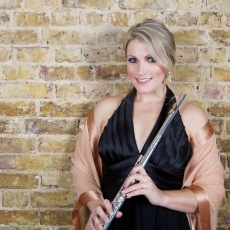Katherine Bryan - Katherine Bryan plays Flute Concertos by Christopher Rouse and Jacques Ibert - Fanfare
This is the third recording of Christopher Rouse's 1993 Flute Concerto - an unusual situation for a contemporary work. The reasons for its popularity are not hard to fathom. Its five-movement structure of slow-fast-slow-fast-slow is easy to follow, it is expertly orchestrated, and it has enough moments of traditional tonality to satisfy the most conservative audience. Although Rouse is American (born in Baltimore in 1949), the Concerto has a pervasive Celtic feel, particularly in the slow movements. The first and last of these are titled 'Amhrán' - the Gaelic word for 'song' - while the central movement is an elegy for James Bulger, the young British toddler who was murdered by two 10-year-old boys back in the early 1990s. This movement is notable for its hymn-like passages: the first, which blooms in a warm surge of string tone, and the second, which builds to a shattering and unnerving climax-the only suggestion in this work of the mega-fortes Rouse likes to include in his music. The fast movements are more complex rhythmically and harmonically, requiring considerable agility from the soloist, whereas beauty of tone and an ability to sustain a long lyrical line are the attributes demanded in the outer movements. Bryan rises to every challenge; a former Juilliard student, she is now principal flute with the Royal Scottish National Orchestra, and has previously recorded concertos by Nielsen and Liebermann with them.
Ibert's Flute Concerto (1933) is much more of an overt showpiece, with its perky, carefree outer movements and smooth central 'Andante'. Frank Martin's Ballade, originally with piano accompaniment and later arranged by the composer for piano and string orchestra, is one of the earliest in his series of short concertante works under that title. A reasonable portion of the flute part lies in the instrument's lower register, helping to establish the cool austerity that characterizes the piece. Debussy's flute solo Syrinx depicts the chaste nymph of that name in ancient mythology, who transformed into a reed by a lake to escape the unwanted sexual attentions of the god Pan. (Seems a rather extreme solution, but evidently that is how 'pan-pipes' came about.) Today Syrinx is in every serious flute player's repertoire, although it was not published until a decade after the composer's death. All three of these works are reasonably well known and have been recorded before: many times, in the case of the Debussy.
Rouse's Concerto was co-commissioned by the American flutist Carol Wincenc, who recorded it for Telarc in 1997 with Christophe Eschenbach and the Houston Symphony Orchestra (of which Eschenbach was then chief conductor)...The Linn release offers some of the most lifelike and vivid sound I have ever heard on CD. (It is a multi-channel recording, but I am only equipped to hear it in stereo, where it sounds brilliant.) The recording catches Bryan's full clear tone beautifully, in perfect balance with the orchestra. For this reason her Ibert and Martin performances could also be regarded as 'best buys,' despite excellent alternate versions featuring Emmanuel Pahud (Ibert) and Aurele Nicolet (Martin), both on EMI...if you are in the market for a stimulating program of 20th-century flute works, very well played and extremely well recorded, try this.


